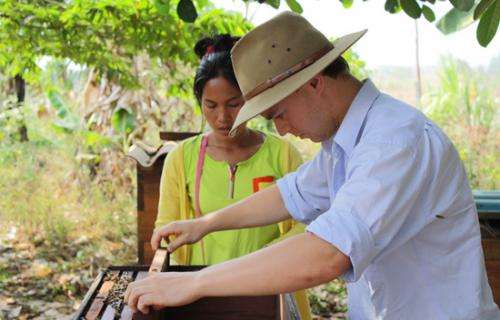Scientists foster bee cultivation in South East Asia

A University of Sydney project to encourage the spread of beekeeping in Cambodia, Vietnam and Laos is providing benefits for both local growers and the native bee population.
Researchers are teaching the basics of beekeeping at six universities in South East Asia as part of a project led by Professor Bill Rathmell, Professor Peter Sharp and Dr Daniel Tan from the Faculty of Agriculture and Environment.
With funding from DFAT's Public Sector Linkages Program, they are looking to improve agricultural practices and the way agriculture is taught at universities in Indochina.
Beekeeping is useful both for honey production and to help pollinate a variety of local crops including sunflower, longan, lychee, cashew and mango, said Dr Tan.
He added: "The unsustainable harvesting of honey from wild bees has become a major problem, causing the extinction of some native bee colonies. Harvesters also run a high risk of stepping on unexploded mines while looking for bee hives in the Cambodian forests."
Dr Tan recently travelled to North-West Cambodia to monitor progress on the project with University of Sydney graduate Sam Malfroy, who works for Plant Health Australia and is assisting with the beekeeping training program.
Dr Tan said: "There has been terrific progress in the two years since the project began. Mean Chey University has developed more than 45 hives of Apis cerana, the native Asian honey bee, and is providing training for local growers and smallholders.
"It has become the largest beekeeper and training provider in Cambodia and the University's Vice-Rector, Dr Yorn Try, has even written a textbook on beekeeping for universities.
"Our work has benefited greatly from the expertise of Professor Pham Hong Thai of Hanoi University of Agriculture, a world-leader in Asian bee-keeping."
Sam Malfroy added that learning to manage hives of the Asian honey bee was critical for the sustainability of native bees in Cambodia.
"Cambodia has a great diversity of native bees, including the red dwarf honey bee, the giant honey bee and stingless bees. Unfortunately, uncontrolled harvesting of these wild colonies is leading to the extinction of these bees in some areas.
"Learning to manage the Asian honey bee not only helps provide an income through honey production and improved quality and quantity of agricultural produce through pollination, but it also helps protect the amazing diversity of bees in Cambodia from wild harvesting."
The project is also seeking to introduce improved mushroom and cropping practices to boost the income of farmers in North-West Cambodia.
Provided by University of Sydney


















